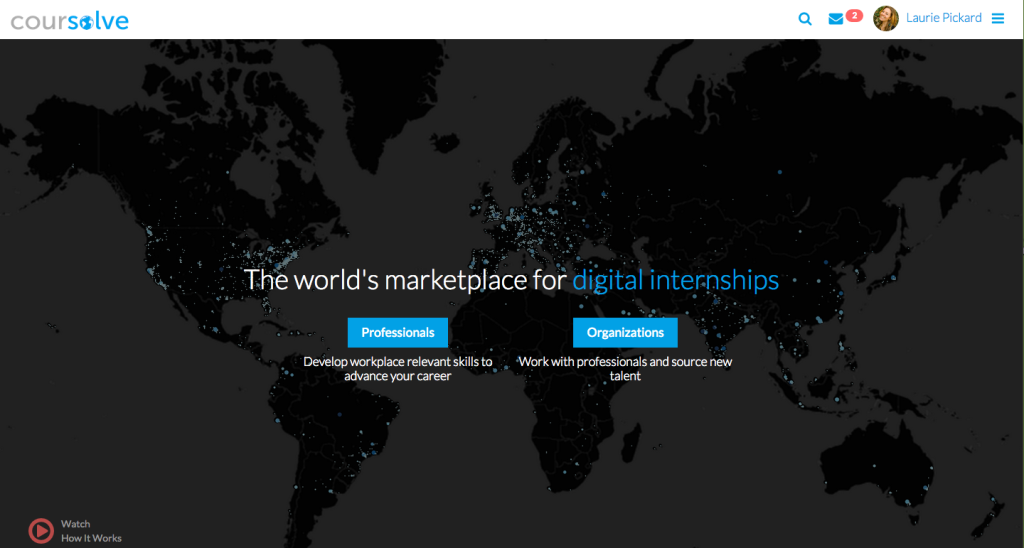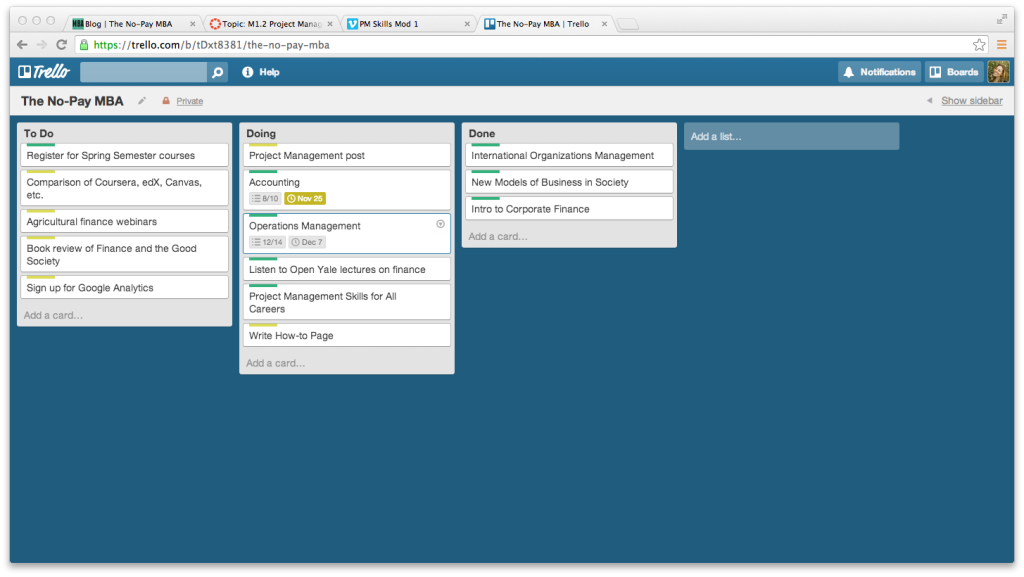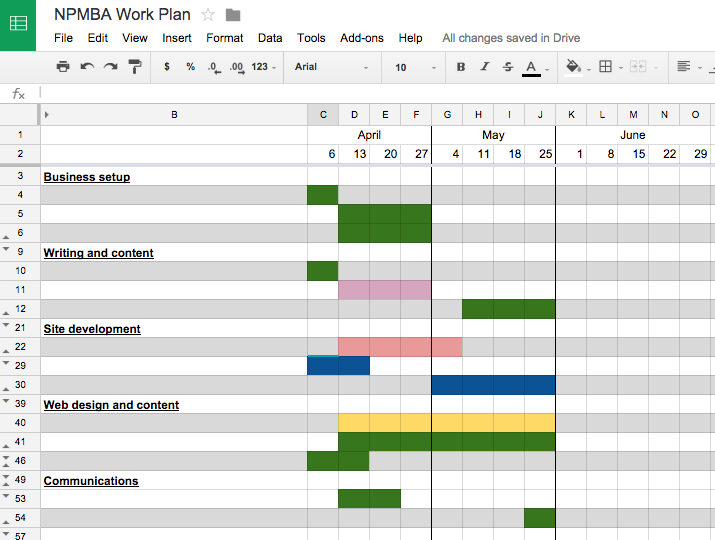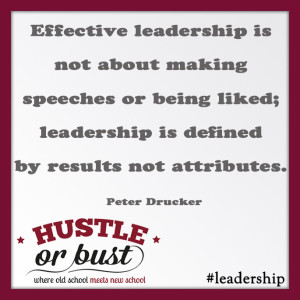by Laurie Pickard | May 3, 2015 | Career Development, Courses, Platforms, and Profs, MOOC MBA Design

The basic hypothesis of the No-Pay MBA is simple: thanks to the advent of massive open online courses, a person who would be capable of completing a master’s in business administration at a university can get an equivalent education without paying business school tuition, using freely available resources.
Most people I talk to seem to accept this premise. The general consensus is that it is indeed possible to learn online and that at least in terms of course content, the education I am getting is equivalent to a regular MBA.
Where things get complicated is at the end of the education. How will my studies be recognized? Who will care that I did enough courses to match a traditional MBA? The job market is degree-driven. Without that piece of paper will I have anything of value when I “graduate” in May 2016?
I’m not bothered by the fact that I won’t be getting a degree because I can see a different path to legitimacy – importantly, one that does not revolve around blogging and does not rely on any special advantage that I might have as the first person to publicly replicate the MBA using MOOCs.
Turn a MOOC education into career advancement
The key to converting a MOOC education from personal development to career advancement is to put that education into practice in a job. We all know that in many industries a bachelor’s degree is a gatekeeper – if you don’t have one, you simply won’t be hired. But if you already have a degree and have been working for a few years, direct experience almost always trumps classroom education. Your degree may help get you in the door, but your experience and your performance on the job ultimately overshadow your degree in their importance.
When you use your MOOC business education in a work setting, you turn it from a series of facts you’ve learned on your laptop into a set of skills you can leverage for a promotion or in your next job search.
Okay, I can hear you saying, that’s all fine and good if you’re already working and can convince your employer to let you take on new responsibilities. But what if you’re not working? Or if your employer is unwilling or unable to increase your responsibilities? Or if you’d like to change industries and can’t find a relevant way to employ your new skills in your current job?
Digital internships for MOOC students
For MOOC students, this is where Coursolve comes in. If you’ve been reading the blog, then you may know that I’ve been excited about Coursolve since learning about their work as a student in Foundations of Business Strategy. Coursolve connects learners from anywhere in the world with businesses and organizations through “digital internships,” collaborative short-term projects that are often linked with MOOC course content.
As a student in Foundations of Business Strategy, I used Coursolve’s platform to find a business for whom I could conduct a strategic analysis as a final course project. Coursolve itself had posted a strategic analysis internship, and given my interest in all things MOOC, I chose to conduct a strategic analysis for Coursolve. The best part? Based on the quality of my work, Coursolve hired me to work on business development – not because I had an MBA but because they had seen how I work first hand.
Businesses can benefit from digital internships
Now that I’m launching a business, I need Coursolve’s platform again. Over the next several months, I’ll be posting my own digital internship – only this time I’m a business owner looking for talented students who want to use their skills in a practical setting. There are several reasons why as a small business owner it makes sense for me to post a digital internship on Coursolve.
First, I’m still learning, and I’m looking to hone my management skills. A digital internship is a low-stakes way for me to improve my ability to manage people who are not physically located in the same place – a key skill given the structure of my business.
Second, I’m looking to build relationships with talented people. While I don’t have immediate hiring needs, I’m excited to work with people who can help build momentum for my business and who I may one day be able to employ.
Third, I’m building my brand. By providing educational experiences to students I’m both paying forward my own experience as an intern and generating good will towards the No-Pay MBA.
And by the way, these benefits don’t just apply to small businesses. Larger businesses can also source talent, promote their brands, and provide management experience to their employees through digital internships.
Join the No-Pay MBA’s digital internship on Coursolve
The No-Pay MBA internship is designed to be done in conjunction with the course Foundations of Business Strategy, taught by Michael Lenox of the University of Virginia’s Darden School of Business. If you’re interested in working with me on this digital internship, here’s how to sign up.
1. Register for Foundations of Business Strategy through Coursera. It’s one of Coursera’s on-demand courses, so it’s available all the time.
2. Go to www.Coursolve.org. Click on the Login button and create a profile.
3. Using the menu in the upper right corner, click Browse under the word Needs. The No-Pay MBA internship is listed in the Business Strategy/Innovation category.
The project involves applying several of the strategic analyses Professor Lenox teaches in his course to the No-Pay MBA business I am launching next month. You will put those analyses together into a final report, which will become part of your educational portfolio. If you do an outstanding job, I’ll be happy to write you a recommendation. I’m looking forward to seeing what you come up with.
by Laurie Pickard | Apr 18, 2015 | Career Development, Community and Networking, Most popular posts

I am what you might call a solopreneur, which Urban Dictionary defines as “an entrepreneur who works alone, ‘solo,’ running their business single-handedly. They might have contractors for hire, yet have full responsibility for the running of their business.” This describes No-Pay MBA to a tee. While I am in some ways a one-woman show, I have managed to assemble a team of consultants who are helping me get to launch day of what I’m calling No-Pay MBA 2.0.
One of the most exciting things about the No-Pay MBA project is its global nature. Almost every country in the world is represented among my readers. Likewise, those who have pre-registered for No-Pay MBAs come from every place imaginable - from Durban to Dallas, Mexico City to Mumbai.
My team is similarly global. Andrea is an American living in Rome, and she’s helping with social media and communications. Adam, a British guy living in Mexico, is on web development. If you take a look at some of his work, I think you’ll see why I’m so excited about what he’s doing to help me build the profile section of the new and improved No-Pay MBA website. Greg in Australia is helping with front-end layout and design; and Kevin Meldau, who is South African and living in Florida, is working on graphic design. He’s just created a new logo that I’m really excited about, and you can see other samples of his work here.
If you count both our places of birth and the countries in which we currently reside, this team of five represents seven countries. Only two of us are in the same time zone.
I’m studying management in my MOOC coursework, but working with this team to launch this business has also been a great experience in project management. I tend to enjoy the challenge of pulling together a great product on a tight deadline. Working with a geographically dispersed team has added a level of complexity to this endeavor that has forced me to up my game.
Below are some of the tools I’ve found helpful and some tips for managing a working relationship even when you’re miles apart.
Tools and tips for managing a global team
You are probably very familiar with the big dogs of remote teamwork - Google Drive and Dropbox for sharing documents, Skype and Hangout for communication.
But here are a few other free tools you may not be aware of.
Tools for working across time zones
World Time Buddy
World Time Buddy is a handy reference for scheduling when you’re in separate time zones. The free version allows you to compare three time zones.

Time Trade
I’ve just started using TimeTrade to schedule appointments. This helpful service allows me to specify when I’d like to schedule which type of appointments and allows clients to book time on my calendar themselves.
Google Calendar
And of course there’s that old standby Google Calendar. What you might not know about Google Calendar is that it automatically translates calendar invites into the recipient’s time zone.
Tools for managing work
Trello
Trello is a simple but powerful application for visual project management. It uses a system called Kanban, in which the project is mapped out using cards. The cards can be moved and rearranged to indicate level of priority and the stage each task is in. Adam and I are using Trello to collaborate on web development.

Gantt Charts
I’m a big fan of Gantt charts for mapping out and visualizing the project timeline. I like to create my own Gantt charts in Google Sheets and then add my team members as collaborators, but there are plenty of free web-based tools that can be used for the same purpose. The chart below shows how I’ve color coded various elements to indicate which person is taking the lead. This article has some great suggestions.

Tools for finding talent
ODesk
I used ODesk for the first time while assembling this team. If you haven’t heard of it, ODesk is one of several sites that act as a marketplace for freelancers to sell their services. These sites are all part of an emergent re-ordering of the workforce, which I find totally fascinating. If you’d like to better understand this new flexible work economy, The Economist had a great piece on the future of work a few months back.
Coursolve
Yes, I am a solopreneur, but I don’t plan to stay solo forever. I’m using Coursolve, a digital internship platform, for my long game. I recently posted a No-Pay MBA project to the site, which I hope will help me further hone my management skills and build my network of talent. If you’re interested, you can join my project here.
Tips on managing a global team
Peter Drucker, who is sometimes called “the father of modern management” is reputed to have said that “organizational culture eats strategy for breakfast.” While the true origin of this quote is up for some debate, its wisdom is generally accepted. Human relationships are the most important part of any business. Creating strong relationships can be more difficult when your team members are not physically in the same place, but it’s still just as important.
Use video, even when it’s awkward.
Don’t underestimate the importance of seeing the face of the person you’re working with. I do a lot of work via email, but a call every once in a while goes a long way towards establishing the kind of human connection that fosters a good working relationship. Even when my connection speed is giving me grief, I still like to at least start face to face in any online call. Whether or not I turn my camera off, this little bit of face time helps to establish a connection.
Make sure consultants see their part in the whole.
It’s important for anyone working on your project to understand where they fit into the big picture, how you plan to use their work, and why it is critical to the success of the project.
Be clear about expectations.
Especially when working with consultants who are not full-time employees, it’s important to make sure that both parties are in agreement about what work is to be done, what constitutes a successful outcome, and of course, compensation.
Tell your people you appreciate their work.
This is so important. Everyone needs to be recognized when they’ve done good work.
In that spirit, I’d like to close this post with a few shout-outs:
Andrea, thank you for being so organized and on top of things. You’ve cut my stress level tremendously and given me what feels like extra hours in the day to get things done.
Adam, thank you for your collaborative work style. I love that I am working with you on my site and that you’ve taken the time to understand my vision for it.
Greg, thank you for all your tips and pointers on SEO and for your great suggestions on design. I can’t wait to see what you come up with!
Kevin, I love your vision and your enthusiasm. Thank you for stepping up to fill a critical need at just the right time.
by Laurie Pickard | Feb 9, 2015 | Career Development, Community and Networking, MOOC MBA Design, Most popular posts
I’m pleased to share a guest post by Nick Switzer, who offers a tremendous example of how a MOOC MBA can be even more valuable than a traditional MBA. For those considering a No-Pay MBA, I expect you’ll find his story as inspiring and intriguing as I did. Enjoy! -Laurie
Why I turned down a company-paid MBA for a No-Pay MBA
 Everyone pursuing a No-Pay MBA is doing so because they cannot afford a traditional paid, brick and mortar MBA, right? A No-Pay MBA is the only option; otherwise, we would all enroll in traditional MBAs, right?
Everyone pursuing a No-Pay MBA is doing so because they cannot afford a traditional paid, brick and mortar MBA, right? A No-Pay MBA is the only option; otherwise, we would all enroll in traditional MBAs, right?
Not necessarily.
I work for a fantastic company with great benefits. One of those benefits is tuition reimbursement. If I take university courses that pertain to my role at the company, then the company pays for my tuition. As an engineer transitioning to a more business-oriented engineering role, I needed some financial and business training. My managing director (let’s call him Steve) knew this, and during a one-on-one lunch he suggested that I pursue a traditional MBA, taking advantage of the company’s tuition reimbursement policy.
I was flattered. Steve was my manager’s manager, a role model in the company, and he was telling me that the company would fund my MBA! However, after some deliberation, I declined this offer in favor of a No-Pay MBA using Coursera and other MOOC providers.
Why did I do this? How could I turn down such a generous benefit from my company?
I’ll give you 5 big reasons.
1. I value my time with my family.
When I started my No-Pay MBA, my wife and I were expecting our first child. My wife was a successful marketing manager for a Fortune 500 company at the time, with no plans to leave her role after maternity leave. I was committed to supporting her career, our family development, and my own career. I did not think it was possible to both perform well at my job and be a supportive father and husband, all while attending MBA classes and studying.
With a No-Pay MBA, I watched half of each weeks’ lectures in the same amount of time I would have spent in traffic commuting to off-site classes. Often I would do my courses while my child was sleeping, either early in the morning or late at night.
In this way, MOOCs allowed me to maximize time with my family.
2. I needed to learn quickly and apply my skills immediately.
In my new role, I needed business strategy and finance understanding immediately! Time lost taking the GMAT, GRE, selecting a program and applying meant real business opportunities lost. Through MOOCs, I was able to access top educational content within minutes of choosing my courses!
By the time director Steve suggested I start a paid MBA, I had already started 2 courses that were paying dividends in the office.
I immediately applied principles learned in class in the workplace with many co-workers who had graduated with paid MBAs, honing my learning in real-life scenarios.
Unlike a traditional MBA, I have the ability to share course materials directly with my co-workers as well. This has resulted in empowering my project teams to learn principles on the fly, when they need them most.
3. I wanted to choose my courses based on what would be most helpful at work.
One of the things I love most about MOOCs is the ability to craft my own curriculum.
I have a passion for data-driven decisions, so I am taking a 10-course Data Science specialization from Johns Hopkins as a focal point in my No-Pay MBA.
This type of curriculum flexibility and the ability to take courses from multiple top universities is simply unbeatable.
This was also helpful to my company because I was able to take the courses I needed immediately. I needed financial analysis and negotiation strategy, and I was able to take those courses right away.
4. I saved my company a lot of money.
In the recession of 2008, many companies suspended their tuition reimbursment programs for at least 6 months. I did not want to see my further education as a financial burden to my company.
As a responsible employee of my company, I made a serious cost-saving decision in pursuing a No-Pay MBA. This was an easy point for my director to understand.
My company is still investing in me, more in time commitment than in cash. This investment has paid off quickly, as my No-Pay MBA has armed me with frameworks that allow me to attack problems quickly.
5. I want MOOCs to succeed!
I believe broad, low-cost access to excellent educational materials will help our world, enriching lives and offering new paths to personal achievement and more stable economic conditions.
I want my daughters to live in a world where they have access to top-notch education without going into significant debt.
I want to see MOOCs succeed. What better way to help this happen than as a living example of the power of low-cost online education?
The Results
 Since I started my No-Pay MBA, my wife and I have been fortunate enough to have two great little daughters. My wife has been promoted, and because our schedules aren’t in conflict, she has been able to go on several international work-trips while I take care of the kids after work.
Since I started my No-Pay MBA, my wife and I have been fortunate enough to have two great little daughters. My wife has been promoted, and because our schedules aren’t in conflict, she has been able to go on several international work-trips while I take care of the kids after work.
On the job, I use frameworks and concepts from my courses every day. Thanks to my No-Pay MBA, I am totally comfortable having high-level financial and business strategy discussions with graduates from traditional MBA programs. I have also earned a promotion since starting this adventure in non-traditional education.
Bottom line: a No-Pay MBA aligned better with my goals of work-life balance and prioritization of my family than a standard MBA would have. It has been fantastic for my family, for my company and for me.
Nick Switzer is an engineer, a German-English technical translator, and a lifelong learner. To see his complete MOOC MBA transcript, visit www.nickswitzer.us.
by Laurie Pickard | Jan 23, 2015 | Career Development

Hi,
I am very interested in this concept of the No-Pay MBA. After single handedly paying and continuing to pay for my undergraduate education my quest for my MBA seems to slip further and further from my grasp. I have often thought about taking these online courses but I still don’t understood their legitimacy in the business world.
If I took the full course work outlined in your curriculum and/or through researching alternative MOOC classes, will the coursework be recognized by employers? Can I legitimately put MBA on my resume?
Please let me know.
Thank you,
J
 Dear J,
Dear J,
Thank you for your message. I get some variation of this question rather frequently, and yours is a very well-articulated statement of this issue, so I thought it might be useful to answer you publicly.
Regarding whether MOOC course work will be recognized by employers, I’d like to get beyond answers like “I don’t know” and “It depends,” though of course I don’t know for certain how employers will view MOOC-based learning and it does depend on on a few factors, including what you studied online, how well you present what you studied, how receptive the particular employer is to self-directed learning, and how your MOOC studies fit into the rest of your work history and education.
This method of learning is still very new, and it remains to be seen how employers will react to applicants with online courses on their resumes. Whatever the answer is today, it is bound to change in the coming months and years. I do think that employers (and the general public) are becoming more and more receptive to online learning, especially given the increasing attention to questions about student debt, the price of college and university education, and concern about whether higher education prepares people adequately for the work force.
For your second question, the answer is easier. Even if you do enough courses to equal an MBA - even if you do double the courses required in a typical MBA program - you cannot legitimately put “MBA” on your resume. You can say “course work equivalent to an MBA,” or you can list your courses. You can also list any series of courses you’ve completed, especially if the series comes with a certificate. You can certainly list your specific skills (market analysis, product branding, financial modeling, etc.). But listing an MBA degree if you don’t have the actual piece of paper from an accredited school is a big no-no.
For both of your questions, getting the best possible outcome vis a vis future employers boils down to presentation. You can think about it this way: a degree from a university with a good reputation is shorthand for all the course work you did, your leadership and extracurricular experiences during your studies, and importantly, the admissions process you went through to get into the program. When an employer sees “MBA, Wharton School” on a resume, the candidate becomes connected with all the associations the employer has with Wharton about rigor, excellence, calibre of student, etc.
If you’re doing a No-Pay MBA, you’ll have to do a bit more to convince people of the legitimacy of your studies. That said, I don’t think you necessarily have to create a website or do a big marketing campaign in order to be taken seriously. Here is my advice on how to structure your studies and your presentation of them in order to ensure that employers will sit up and take notice.
- Do courses that are rigorous and related. This means taking tough courses, finishing those courses, and doing several on the same topic. Build the case that you have gained real expertise.
- Don’t rely on employers to put the courses together into a package. Rather than listing a bunch of courses on your resume, tell the story about how they fit together. “Course work equivalent to an MBA” tells a much more interesting story than a series of course titles does. Even if you don’t do a complete MBA’s worth of courses, try to package your courses into something bigger. You can use phrases like “Advanced course work in finance” or “Data science course series.” MOOC platforms like Coursera and edX are increasingly offering series of courses, which could be useful for this purpose. For more tips on how to put MOOCs on your resume, see this blog post.
- Supplement your course work with practical experience. If you can demonstrate how you’ve used your courses outside the (digital) classroom, you make a much stronger case that you’ll be able to use those skills in a new job. Use what you learn in or current job or if necessary, take on an intern or volunteer position. For opportunities to collaborate with other online learners on experiential learning project, check out Coursolve’s digital internship platform if you haven’t already. (Disclaimer: I am working for Coursolve, but that’s because I believe in what they do so whole-heartedly!) And of course, be sure to highlight your practical business experience on your resume.
- Showcase your work. I don’t think you need to have a personal website, but that said, it could certainly help. If you don’t have a personal website you’ll want to use a site like Accredible or Degreed, or even LinkedIn to post your course certificates and some examples of your best work. When it comes to posting your work, I strongly believe that less is more. Only present what you’re most proud of. And please feel free to take advantage of my standing offer to profile you on my site.
by Laurie Pickard | Dec 19, 2014 | Career Development
A version of this post originally appeared on SkilledUp Trends and Insights.

Should you go for certificates and badges or try to build a portfolio of your work? What type of signal will be most valuable in the job market? How can you turn MOOC learning into a salary increase?
If you are an employer, how can you use the MOOC revolution to benefit your business?
If you are a regular reader, then you know that I’m extremely interested in how MOOCs will create value in the market - not just in the sense of people enjoying free courses, but quantifiable, bottom-line value. I’ve written about the potential for MOOCs to change the value equation within the higher education industry itself. Now I’m turning my attention to another market - mid-career professionals and the companies that employ them.
Having taken over a dozen business MOOCs, I am positive that what I have learned in my MOOC courses is turning me into a more productive worker. In some ways my MOOC education is even better than my previous undergraduate and graduate work. Or it may just be that I am better as a learner; I am much more focused on education that I can use to create value at work, and I have a clearer understanding of what skills and knowledge I need to acquire in order to become a better professional. I would guess that many other MOOC users feel the same. After all, the majority of us already have degrees, and the average student age is in the 30s.
I’m convinced that MOOCs are creating value. But the question remains - who will capture that value?
What follows is my attempt to lay out the various ways employers and employees might find value - the quantifiable kind - from MOOCs and other forms of free education. MOOCs are still longer on potential than they are on proven value creation. The good news is that there is still time to get in on the ground floor of a movement that could change how education translates into the world of work.
How to Turn MOOC Coursework into a Salary Increase
1. Build the experience line on your resume.
Probably the most straightforward way MOOC education can create value for a mid-career learner is if you’re able to put some new skills into practice in your current job. Ultimately, you should be able to leverage your new responsibilities to either be promoted within your organization, or to get a higher paying position in another organization.
2. Acquire credentials recognized in the market.
So far, no MOOC-related credential has emerged as dominant in the job market. Certificates from single courses - Coursera Statements of Accomplishment, edX Verified Certificates, and the like - don’t present a clear pathway to career advancement. More promisingly, the MOOC providers are increasingly grouping courses into certificate programs - Coursera Specializations, edX XSeries, etc. - and they face competition from companies like Degreed that plan to create independent credentials for a broad range of subjects. All of these credentials are in their early stages, so we’ll have to wait and see which - if any - become a strong signal in the job market.
Udacity’s Nanodegree program has made the most headway in paving the MOOC-to-employment pathway. Of course, it’s easier to provide a credential for a narrow skill set (e.g. Ruby on Rails) than for a broad one (e.g. leadership). I expect that, following Udacity’s lead, technology credentials from sites like Code Academy, Thinkful, and others will be the first to provide job seekers with tangible advantages. But credentials for other skills - even soft skills - are sure to follow.
3. Build a portfolio that makes the case for your professional abilities.
In the absence of credentials with proven market value, a portfolio can be a good way to demonstrate your chops in a particular area. Some people are even claiming that portfolios are preferred over resumes by a growing number of employers. Again, coders and programmers are leading the way, with many sites that allow them to showcase their work. For the rest of us, sites like Accredible, SlideShare, and even LinkedIn might be good forums in which to provide evidence of one’s abilities, though I’m not convinced that employers will prefer such labor-intensive recruitment methods over an easy signal like a degree from a reputable institution. I’d love to hear from anyone who can prove me wrong about that! The portfolio approach is of course my chosen method for turning my No-Pay MBA into a professional credential.
How MOOCs Can Create Value for Employers
1. Use MOOCs as training for current employees.
The most obvious way for employers to reap value from free and inexpensive online courses is to replace a more expensive training programs, to supplement existing training programs, or to put in place a training program where none existed before. Even my employer, USAID, which has plenty of resources to create its own courses, is encouraging employees to take MOOCs that are relevant to the work we do. Companies that don’t already produce their own training materials stand to benefit the most from implementing a free or low-cost training program using MOOCs or other online courses.
As with all training programs, the goal is to make the company’s current workforce more productive. If my experience is any indication, MOOCs are capable of doing this.
2. Encourage self-directed MOOC learning among employees.
Even if your company doesn’t want to spend the effort to implement a formal training, it may be a good idea to encourage self-directed MOOC learning among employees. Individuals are in fact more likely to know what skills they need to become better at their jobs. Giving permission for employees to spend some of their at-work time on personal learning can also increase job satisfaction.
3. Recruit via MOOC.
If employers partner with MOOC providers, they can get employees who have been educated in a way that directly matches what the employer is seeking. In this way, MOOCs have the potential to overcome the mismatch between traditional higher education and the needs of employers. As Harvard professor Clayton Christensen put it in a recent article in the Boston Globe,
“Many colleges and universities resist the idea of training students for jobs. Yet it is employers who are truly the ultimate consumers of degree-holders. If alternative education providers, by partnering or collaborating with employers, are able to deliver prospective job candidates who are as just as qualified — and in some cases, better suited — for the opportunities at hand, companies will begin to validate these learning pathways.”
Larger companies may be able to work with MOOC providers to create courses or learning pathways that directly match their needs, such as AT&T has done with Udacity. But smaller companies may also be able to identify courses or course series that provide the specific training that is most applicable to the job. Identifying people who succeed in those courses or course series could be a powerful form of recruitment.
4. Encourage hiring managers to consider resumes with non-traditional forms of education.
What will you or your hiring manager do when a resume comes across your desk that has a MOOC education line? Okay, I’m biased, but I see a huge opportunity for employers who are willing to take a risk on hiring people whose training is MOOC-based or otherwise self-directed. Trust me, I’m not the only one who is using free online education to increase my professional abilities. Now - before anyone has figured out how to credential this type of education, and before it has an established market value - is the time to snap up these entrepreneurial individuals.
Make no mistake: MOOCs are still longer on potential than they are on proven value creation. The good news is that there is still time to get in on the ground floor of a movement that could bring efficiency to talent recruitment, talent development and talent retention. Wouldn’t you or your business benefit from being part of it?
by Laurie Pickard | Oct 4, 2014 | Career Development

The debate about MOOC education rages on in both online and print publications. Just as important as whether low completion rates are a problem, and whether traditional colleges should be quaking in their boots, is the question of whether the market will respect MOOC education. In other words, can a virtual stack of Coursera Statements of Accomplishment translate into real job opportunities?
Below is one answer to that question. Mark Olvito is the CEO of LM Foods, LLC, a consumer packaged goods company in New Jersey. He reached out to me recently to say that he has encouraged his employees to look into MOOC education as a way of furthering their professional advancement. He also graciously accepted my offer of a guest post on the No-Pay MBA blog. I encourage you to visit his thought-provoking and inspiring blog Hustle or Bust. Read on for Mark’s thoughts on MOOC learning and its relationship to the search for outstanding candidates.
 To say that I’m fascinated by the movement towards MOOC’s, and in particular the structured approach profiled on No-Pay MBA, is an understatement. That’s from the perspective of a father, and as a lifelong student of business.
To say that I’m fascinated by the movement towards MOOC’s, and in particular the structured approach profiled on No-Pay MBA, is an understatement. That’s from the perspective of a father, and as a lifelong student of business.
But I play another role in life. It consumes 65+ hours a week. It consumes 90% of my mental “think time.” It’s that of company owner and CEO. From that vantage point, the audience of No-Pay MBA may be interested in my thoughts related to the following:
Can a MOOC education translate to employment opportunities the way a conventional degree can?
The short answer:
The real answer?
HELL YES!
I’m biased, and you need to understand where the bias comes from. Here’s what I’ve based my career on, and the assumption I operate under every day as a company owner.
Talent drives everything.
There’s a problem, however. As the final decision maker regarding talent coming INTO my company, it is flat out hard to find people who clearly demonstrate how they can step into my company, learn fast, accelerate our progress, and help build a winning team. There are plenty of credentialed people chasing opportunities. MANY have advanced, conventional degrees. Too many. More supply than demand. Few stand out.
As a “buyer” of talent, hiring can be a truly frustrating experience.
I call the missing element “HUSTLE.” I need to hire people who have not just accumulated knowledge, but who have the inner drive to put that knowledge into practice. People not afraid to get dirt under their nails. People who find ways to solve big problems with fresh thinking.
What if a candidate emerged who had successfully completed a “No Pay MBA?” They didn’t just go through the motions and check off the boxes. They actually understand the curriculum and can clearly communicate that knowledge.
I’ve worked with Ivy League MBAs. Some are great and will create millions of dollars of wealth. I’ve also worked with some that can’t analyze their way out of a paper bag, or deal with people in a way that lifts them up vs. tearing them down.
My advice to the No Pay MBA audience?
Keep at it. Get the knowledge. Start demonstrating that you can apply it. Don’t worry about “measuring up” to the conventional MBA crowd. Embrace this key point of difference, and focus on making something happen with this knowledge.
Good Luck!
May you live each and every day of your journey with Hustle. Or Bust.
Mark Olivito
CEO LM Foods, LLC
www.hustleorbust.com

















